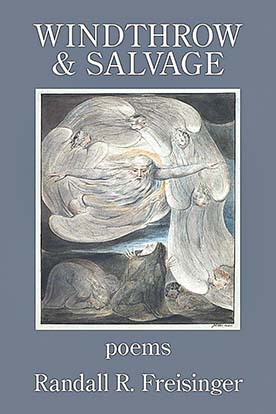Putting thoughts into words: Local writer turns life into poetry for everyone to read

Provided photo Former Michigan Tech professor Randy Freisinger has recently written a book of poetry based on life experiences.
HOUGHTON — Several years into writing fiction, with the 30th page of a short story in his typewriter, Randy Freisinger came across the work of contemporary poet James Tate.
What he would taken 30 pages to express, Tate got across in 30 lines, Freisinger said.
A day later, Freisinger had his first poem.
“I discovered at some point that I preferred doing scrimshaw rather than building cathedrals,” said Freisinger, who taught for 32 years in Michigan Technological University’s humanities department. “I was more suited to working in small spaces. I never went back to fiction after that.”
Freisinger recently released his fifth collection “Windthrow & Salvage.” It can be bought online from publisher Kelsay Books, Amazon, and Barnes & Noble. It is also available locally at North Wind Books in Hancock and at Grandpa’s Barn Books in Copper Harbor.

Provided photo Pictured is the cover of poet Randy Freisinger’s recently published works, “Windthrow & Salvage.” Freisinger taught at Michigan Tech for 32 years in the humanities department.
The name came from an informational plaque Freisinger spotted years ago while walking on the Tech Trails. It refers to a sudden downburst of wind that destroys timber, followed by a salvage operation that combs through the aftermath to find anything worth reclaiming.
The title mirrors the structure of the book, Freisinger said: the first focusing on the damage life does to us, then a second part with little moments of gestures that can provide redemption.
The book’s cover features a William Blake engraving of the Book of Job, in which God appears to Job in the form of a whirlwind.
Both sections are prefaced with a quote from Victorian poet Gerard Manley Hopkins’ sonnet “Carrion Comfort.” In the first, Hopkins asks God why a horrible tempest has been directed toward him. The quote preceding the second section, Hopkins concludes the wind is “so my chaff might fly,” leaving the valuable grain behind.
“That to me summarized the arc of the book, that possibly there’s some spiritual redemptive force in the universe that we can turn to,” Freisinger said.
In “Dickering With God,” a poem from the second section, Freisinger recounts a 3 a.m. phone call from someone calling a wrong number. Asking for an “Artie,” the man told Freisinger, “This is Vernon. I’m lost.” Freisinger gave him a curt “wrong number,” as one does at 3 a.m. Thinking about it later, he regretted it. In the poem, he connects Vernon’s plight with monk Thomas Merton’s prayers to God and his own aging.
“I brooded over that for a year or so, then it became that poem,” he said. “Ultimately I guess you would say I struggled spiritually with my own faith issues, still do, but have been edging closer to some sense of at least appreciation for the mystery that the universe holds for us.”
Even when writing a collection based on Norman Rockwell paintings, he said, his own biography crept in. About 70% of the poems in the new collection are at least loosely based on his life, Freisinger said. Figures from his life pop up: His father working with tools in the basement, an itinerant uncle. Some settings have Copper Country settings, from a slowpitch softball tournament in Alston to the dock at Dreamland.
When teaching poetry to students at Tech, he told them to pay attention to those “cockleburr moments,” that stick in their mind.
“Those memories probably have some meaning, and you need to interrogate those and see if you can make something out of them,” he said.
Some poems are based on news items that resonated with him. “Our World” is about a boy who killed a swan. On the other end of humanity, browsing through the paper at the doctor’s office gave Freisinger the story of a former NFL tight end who caught a baby falling out of a window in the Bronx.
The poem struck an unexpected chord with readers across the country, who sent clippings of other stories about babies falling out of windows.
“It’s almost like a plea to the powers that be, the gods, whatever, to keep catching these babies because a lot of them are falling, and not of them being caught,” he said.
Freisinger said his next step would be a compilation of poems from earlier books, with some new ones added in.
Retired since 2009, Freisinger starts his day by reading poets who have been influential to him. After a half-hour or so of absorbing their cadences, he is ready to begin writing.
Taking longer was “Plato’s Breath,” the title poem of that collection, which he worked on for two years and hundreds and revised hundreds of times.
“On one extreme is pure luck and the muse speaking directly to you, which is very rare, but on the other hand it’s just a lot of hard work, and a lot of digging and futzing around before you find something that gets you going,” he said.






